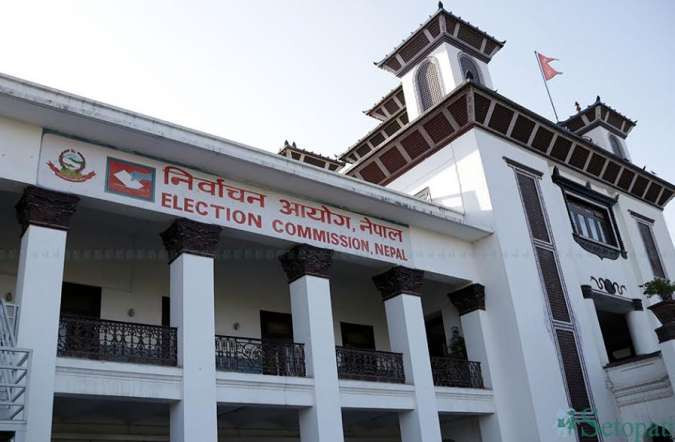Experts have deemed the Election Commission provision requiring local elected representatives to resign before filing nomination for the upcoming election to be right.
The code of conduct issued by the Election Commission states that any elected or nominated official who is receiving salary and other benefits for serving in any local body or another body owned by or under control of a local body or being run with grant from a local body must resign before filing nomination for the upcoming local election to be held on May 13.
The main opposition CPN-UML, which had won the most positions in the last election, has protested against the provision in the code of conduct questioning why chiefs of the local bodies should resign in a way that service delivery is affected when the prime minister (PM) need not resign before the general election.
But two former chief election commissioners (CEC) Nilkantha Uprety and Ayodhi Prasad Yadav, and constitutional expert Bipin Adhikari have defended the provision.
“We must look at the effect the difference between the candidate with all the facilities and those without makes. The incumbents can go promising this and that. The others may not get equal opportunities and I feel that would not be fair. The code of conduct of Election Commission is right for fair and free election,” Uprety told Setopati.
Yadav also defended the provision pointing that there will be a gap of just over two weeks between the date for filing candidacy and voting. “All candidates should go to the election on equal footing and should be allowed to campaign. The Election Commission decision is, therefore, right,” Yadav opined.
Many point that the Constitution has not imagined the positions at local bodies remaining vacant to argue that the Election Commission provision is wrong but Yadav claims that the staffers can operate the local bodies during the period. “What will happen if there are no elected representatives for 15-20 days? There were no elected local representatives for 20 years before the last local election. There are staffers. It would suffice if they work. There will be vacancy for some time while going for election.”
The election commission has kept the provision on the basis of the Local Level Election Act 2017 which states in clause 13 that any person receiving salary while serving the Nepal government, or provincial government or in any body owned by or under control of the Nepal government or provincial government or being run with grant from the Nepal government cannot become candidate in the local election.
The act also prohibits any official who is receiving salary and other benefits for serving in any local body or another body owned by or under control of a local body or being run with grant from a local body from filing candidacy in the local election.
The Election Commission has kept the provision requiring local elected representatives to resign before filing nomination for the upcoming election in its code of conduct on the basis of the provisions in the act.
Chairman of Helambu rural municipality Nima Gyaljen Sherpa, elected on the ticket of ruling Nepali Congress, has already moved the Supreme Court against the decision.
Constitutional expert Bipin Adhikari attributed the current dispute to lack of clarity in the election law. “The Constitution does not envision vacancy between the new and old local governments. We must develop laws and system as the Constitution does not have any provision about how to manage such transition period. The Local Level Election Act was drafted only with the view of holding the election for the first time (after a gap of two decades). But it did not think about management of the transition period before the second election,” Adhikari explained.
He added that not all the positions will remain vacant as all the elected officials will not necessarily contest in the upcoming election.
Former CECs Uprety and Yadav opined that election government can be formed even at the local level to resolve the dispute. But Adhikari said there will be complexities in that as the Constitution does not imagine acting government before local election as in the case of federal and provincial elections.
“One should not be allowed to exercise the authorities of the position if the local government were made acting government. It would not be appropriate to pay them if they are not allowed to exercise authorities on the other hand. The election can be affected if the incumbents again contest for local election. The elected local representatives, therefore, must quit their position while again contesting local election. The spirit of the Local Level Election Act is that there should be level playing field for local election and one candidate should not be allowed to contest with an advantage,” he explained.
There was no such provision of resignation of incumbents in the local elections held in the past including those during the Panchayat regime.
The directives for local election issued during the Panchayat regime in 1982 had prohibited use of government resources including vehicles during the election campaign.

